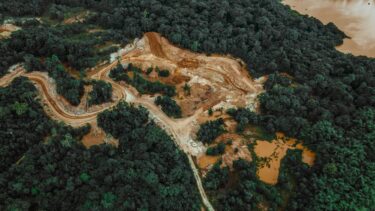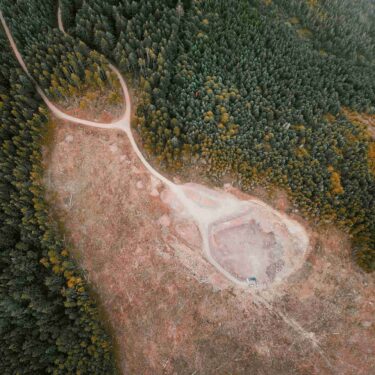Home – Regulations – EU Deforestation Regulation
Table of contents
- What is the EUDR?
- Timeline for EUDR Compliance
- Who is affected?
- How to comply
- How Anthesis can help
- EUDR FAQ
- Contact Us
Share this guide
What is the EUDR?
The European Union’s Deforestation Regulation (EUDR) is a groundbreaking initiative designed to combat deforestation associated with the consumption of certain products within the EU market.
The EUDR requires companies to adhere to stringent regulations to ensure their products are free from deforestation. This regulation replaces and expands upon the European Timber Regulation, extending its scope beyond legality to cover sustainability aspects.
Purpose of the EUDR
The EUDR was introduced with the primary goal of addressing the environmental damage caused by deforestation and forest degradation. The regulation outlines several key objectives:
- Combat Deforestation and Forest Degradation: The EUDR aims to ensure that products consumed within the EU do not contribute to global deforestation or forest degradation. It specifically targets key commodities such as cattle, cocoa, coffee, palm oil, rubber, soy, and wood, which have been linked to deforestation.
- Reduce greenhouse gas emissions: By promoting the consumption of deforestation-free products, the EUDR aims to significantly reduce the carbon emissions associated with production and consumption practices in the EU.
- Promote Sustainable Supply Chains: The EUDR encourages businesses to implement sustainable practices in their supply chains by ensuring that commodities are produced both legally and sustainably. This includes adopting traceability measures and conducting thorough risk assessments to ensure compliance with the regulation.
- Align with EU Environmental Goals: The EUDR is part of the broader European Green Deal and the EU Biodiversity Strategy for 2030, which aim to achieve no net emissions of greenhouse gases by 2050 and protect biodiversity across the continent.
- Protect Primary Forests: The regulation emphasises the protection of primary forests, which are vital for biodiversity and ecosystem services. These forests are distinguished from plantation forests, which do not provide the same ecological benefits.
- Address Human Rights Issues: In addition to environmental concerns, the EUDR considers the rights of indigenous peoples and local communities, especially those impacted by deforestation and changes in land use.
What Information Do Organisations Need to Provide?
For businesses that operate within the EU or trade commodities linked to deforestation, the EUDR imposes specific obligations that must be met to ensure compliance. These obligations include the following key requirements:
- Scope of Commodities: The regulation applies to several key commodities, including cattle, cocoa, coffee, palm oil, rubber, soy, and wood, as well as products derived from these commodities, such as chocolate or leather.
- Due Diligence Obligations: Companies are required to implement a robust due diligence system that ensures the commodities they sell within the EU are not sourced from deforested areas or contributing to forest degradation. This system includes:
- Information Collection: Companies must gather data such as geolocation coordinates, production quantities, and the country of origin for the commodities they are sourcing.
- Risk Assessment: Businesses need to evaluate the risk of non-compliance by analysing the collected data against established criteria to assess the likelihood of deforestation-related risks.
- Risk Mitigation: If risks are identified, companies are required to implement appropriate measures to mitigate and minimise these risks to ensure compliance with the regulation.
- Documentation and Reporting: Companies are required to maintain comprehensive records of their due diligence activities for a minimum of five years. Starting in 2025, businesses will also be required to publish annual reports detailing their compliance efforts.
- Compliance Framework: Companies must establish a clear compliance framework within their organisations, outlining roles and responsibilities to ensure the proper implementation of the EUDR requirements.
- Geographical Risk Assessments: The EUDR classifies countries into different risk categories based on their likelihood of contributing to deforestation. Depending on the risk level of the country, companies may have to adhere to different due diligence requirements. Countries deemed “low risk” may have simplified obligations, while “high risk” countries will require more stringent measures.
- Penalties for Non-Compliance: Non-compliance with the EUDR can lead to significant penalties, including fines of up to 4% of the company’s annual turnover, confiscation of non-compliant products, and temporary bans from public procurement processes.
- Implementation Timeline: Large and medium companies are required to comply with the EUDR starting from December 30, 2025, while small and micro-sized enterprises (SMEs) have until June 30, 2026, to meet the compliance requirements.
Organisations engaging in the EU market must undergo detailed due diligence and verification processes to demonstrate the deforestation-free status of their products.
This involves providing comprehensive information on the traceability of products and ensuring compliance with relevant legislation in the country of origin. The due diligence process aims to enhance transparency and traceability in the production and marketing of products associated with deforestation.
What Changes Are Coming?
After final approval of an amendment in December 2024 , the law is set to come into force December 30, 2025 for large operators and traders, and June 30, 2026 for micro and small enterprises. While there may be significant shifts in timelines, the core text itself and responsibilities stipulated in the law remain largely unchanged. This includes exercising diligence in supply chain management, scrutinising sourcing practices, and ensuring products meet the sustainability criteria set by the regulation.
The EUDR marks a shift from focusing solely on the legality of products to embracing a broader sustainability perspective, covering key commodities such as beef, cocoa, coffee, palm oil, soybeans, rubber, wood, and their derivatives.
To further assist companies in preparing for the law, the EU Commission published an accompanying guidance document and updated FAQ to clarify common questions and facilitate compliance.
Timeline for EUDR Compliance
The EUDR will officially come into force on December 30, 2025. At this point, businesses operating in the EU or trading with the EU must ensure that their products meet the sustainability criteria outlined in the regulation.
SMEs have been given an additional six months, until June 30, 2026, to comply. In preparation for these deadlines, companies are encouraged to establish supply chain monitoring systems, improve transparency, and ensure the traceability of their products to avoid penalties for non-compliance.
Who and What is Affected?
The EUDR applies to any organisation trading products associated with deforestation within the EU, whether as an operator putting the product on the market for the first time or as a trader distributing the product.
The regulation casts a wide net, affecting various industries, including clothing brands, coffee roasters, and others sourcing cellulosic fibres or dealing with commodities linked to deforestation. Companies need to be aware of the potential penalties, including fines of up to 4% of annual turnover, for non-compliance.
What Happens Next?
The twelve month delay presents companies an opportunity to continue working towards compliance. Effective implementation involves establishing a supply chain monitoring system, improving transparency, and ensuring traceability to identify and address unsustainable business practices. Certifying organisations like the Forest Stewardship Council can assist companies in meeting the legislation’s requirements.
Additional updates that may help companies in their transition pertain to the country benchmarking that will dictate the extent of due diligence required and the Information System that will house due diligence statements. The EU Commission is still developing the country benchmarks but has indicated that most countries will be classified as “low risk”. Products originating from low-risk origins require “simplified due diligence” wherein geolocation coordinates must be included within the due diligence statement, but a full risk assessment (to assess and mitigate risks) is not required unless there is a potential deforestation or legal compliance risk identified.
Additionally, the EU Commission announced that the Information System where due diligence statements will be submitted will be operational and accepting registrations in November 2024. Companies are encouraged to take advantage of upcoming training sessions and are welcome to register with the system and begin submitting due diligence statements.
How to Comply with EUDR
To comply with the EUDR, companies must take a structured approach to ensure that their products do not contribute to deforestation or forest degradation.
EUDR Penalties
Businesses that fail to comply with the EUDR can face substantial penalties. These include fines of up to 4% of the company’s annual turnover, confiscation of non-compliant products, and bans from public procurement processes. The strict enforcement of the EUDR highlights the importance of businesses taking proactive steps to meet the regulation’s requirements and avoid costly consequences.
How Anthesis Can Help
At Anthesis, our Forest Positive team is ready to support companies in navigating the complexities of the EUDR. We offer a range of services, including benchmarking, target setting, policy development, supplier engagement, monitoring, verification, and communication. As a recognised Delivery Partner by the Accountability Framework initiative, we utilise international norms and good practices to help companies assess, prioritise, and address deforestation-related risks in their supply chains.
Frequently Asked Questions
The EUDR aims to minimise the EU’s contribution to global deforestation and forest degradation, reduce greenhouse gas emissions, and combat global biodiversity loss by ensuring that products associated with deforestation are not marketed in the EU unless they comply with sustainability criteria.
Companies will have 18 months from the official entry into force of the regulation to adapt to the new rules. SMEs are granted a longer adaptation period.
Non-compliance may result in fines of up to 4% of annual turnover for companies allowing deforestation-linked commodities to enter the EU.
Anthesis offers a range of services, including benchmarking, target setting, policy development, supplier engagement, monitoring, verification, and communication, to help companies create deforestation- and conversion-free supply chains.
The Accountability Framework serves as a guide for achieving ethical supply chains in agriculture and forestry. Anthesis, recognised as a Delivery Partner, utilises the framework’s core principles to support companies in addressing deforestation-related risks.
Related Content
Get in touch
We’d love to hear from you
We are the world’s leading purpose driven, digitally enabled, science-based activator. And always welcome inquiries and partnerships to drive positive change together.





